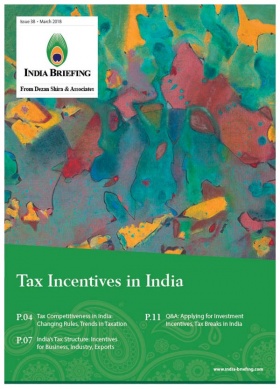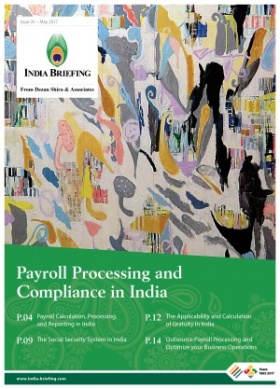A Guide to Franchising in India
India offers enormous potential for foreign franchisors who tailor their brand to fit into the country’s dynamic consumer market. India’s huge market has created a space for competitive franchises to thrive while rising incomes have enlarged the demand for foreign brands.
To succeed in the Indian market, franchisors will need a robust understanding of the country’s regulatory structure due to the absence of comprehensive franchise-centric legislation.
In this article, we explain the entry strategies for foreign franchises interested in establishing an Indian presence. We then highlight the legal precautions necessary for such companies to secure their position in the Indian market.
Growing allure of foreign brands
India’s franchising sector has steadily grown every year since 2008 and has the potential of hitting US$51 billion in 2017.
Franchising fits well in India’s current growth and urbanizing trends. Malls – hubs for franchises – have mushroomed in the country’s affluent metropolises and even in tier-II and even tier-III cities. Rising personal disposable incomes among India’s urban classes has led to an overall increase in consumption and brand consciousness.
Companies that simultaneously tailor their products to regional tastes while creating new market niches, can position themselves to tap into India’s rapidly growing and aspirational consumer demand. Domino’s Pizza, for example, opened their first outlet in New Delhi, in 1996 – at a time when relatively few pizza restaurants existed in the country. Now, the company boasts of over 1000 franchises across India – the largest number of outlets outside of its home country U.S.
Further, foreign franchisors will benefit from India’s league of entrepreneurs. Many Indians consider franchises, especially those with a foreign reputation, as a relatively low risk means of establishing a business in the competitive Indian market.
Choosing an appropriate entry strategy
India offers several entry options for franchises, which include:
- Direct franchising;
- Master franchising;
- Regional franchising; and
- Local incorporation.
Direct franchising is where a company creates a direct network of franchises. This works well for local companies with pre-existing experience in India. However, it can prove to be challenging to foreign companies entering India for the first time.
Master franchising is where a company awards exclusive rights to develop a foreign brand to a local entity, often accompanied with a large investment made by the franchisor. The master franchisee is then in charge of developing the company’s brand either through cultivating a sub-franchised network or opening outlets owned by the master franchisee (though the two are not mutually exclusive).
Regional franchising operates in the same way as master franchising but covers only a specific regional area as opposed to the entire country. Given India’s diversity along with the complexity of state-specific laws, many franchisors choose a regional franchising approach.
Local incorporation is when a foreign franchisor forms a subsidiary company and awards it franchising rights in India. The American fast food chain Subway, for example, has established a subsidiary in India, which handles their franchising network.
What sectors are most receptive to franchises?
Successful franchises in India generally reflect larger global trends. The most successful franchises world-wide cater to middle class tastes and attempt to capitalize on consumers’ leisure time, whether they be retail stores, cafes, or restaurants.
India offers additional avenues for franchising given the country’s high level of privatization in education and health care.
The most successful franchise sectors in India are:
- Food and beverage;
- Hotels;
- Retail;
- Beauty and fitness;
- Health care;
- Medical services; and
- Education.
Maneuvering through legislative gaps
India does not have comprehensive legislation related to franchising, meaning there are no direct, potentially restrictive regulations on franchisors. However, this lack of direct regulation creates tremendous confusion as a patchwork of national and regional laws arbitrarily governs franchisor-franchisee relationships.
The following laws impact franchisor-franchisee relations in India:
- The Indian Contract Act, 1982;
- The Trademarks Act, 1999;
- The Designs Act, 2000;
- The Patents Act, 1970;
- The Copyright Act, 1957;
- The Competition Act, 2002;
- The Foreign Exchange Management Act, 1999;
- Income Tax Act, 1961;
- The Consumer Protection Act, 1986; and
- The Arbitration and Conciliation Act, 1996.
Given this regulatory ambiguity, franchisors must pay close attention when drafting and agreeing upon contracts with franchisees.
A strong contract is essential in compensating for nonexistent or confusing regulations that can otherwise undermine franchise relations.
Foreign investment and franchise establishment
While franchisors may not imagine themselves to be investors, many franchisors inadvertently fall into the category of ‘foreign investors’, and are thus beholden to the rules of foreign direct investment (FDI).
How do foreign franchises become foreign investors?
- When the franchisor directly owns outlets in India; or
- When a master or regional franchisee has some degree of corporate ownership.
Many foreign franchisors open their own outlets in India, usually to capture a portion of the profits or simply to serve as a training facility for new employees.
In other cases, a master or regional franchisee, which a foreign company partners with, may already have some degree of foreign ownership. In both cases, franchisors are participating in FDI.
FDI regulations can dramatically reshape a franchisor’s legal responsibilities in India.
For instance, the Reserve Bank of India (RBI) previously mandated that single-brand retail companies with over 51 percent FDI must source a minimum of 30 percent of the value of their goods from Indian companies.
Now, relaxations to the FDI policy allows foreign retailers to meet this requirement – incrementally – within the first five years of their operations in India. Further, a retailer can source material from India for their international product lines but also have it count towards their domestic sourcing requirements.
Most retail franchises fall into the single-brand category (retailers who exclusively sell their own products) and sourcing 30 percent of their products from Indian companies can prove to be difficult.
Foreign retailers often struggle to secure regular access to quality products that can accommodate the scale of their production.
Retailers selling specialty items – foreign perfumes or advanced technologies for instance – can find these domestic sourcing requirements particularly challenging.
New franchisors should regularly monitor changes in FDI regulations.
Protecting your brand
With the Trade Mark Rules, 2017, India has created a faster, simpler, and more transparent registration process to trademark a brand.
Furthermore, brands now have the option of listing their trademark on the Indian government’s ‘well-known’ trademark list, which provides increased security.
Franchisors interested in being included on this list must prove the brand’s reputation and pay a fee of approximately US$1,500 (Rs 1 lakh).
While India struggles to maintain certain intellectual property rights, Indian courts do have a history of protecting internationally known trademarks.
When the American brand Calvin Klein entered the Indian market, they discovered that an Indian company had already been using their trademark. Calvin Klein had registered their brand’s trademark internationally but not domestically in India. Despite this, the Indian court issued an injunction against the Indian company using Calvin Klein’s brand.
Safeguarding your franchise from bankruptcy
Gruelingly slow processing times for bankruptcy and insolvency have plagued businesses in India in the past.
The new Insolvency and Bankruptcy Code, 2016 aims to ease the process by consolidating existing policies, regulating insolvency professionals, and accelerating processing times for bankruptcy cases.
The success of the new Bankruptcy Code will, inevitably, be dependent on the effectiveness of its implementation.
Contracts between franchisors and franchisees must take India’s Bankruptcy and Insolvency Code into consideration; contracts should clearly stipulate that a franchisor can terminate an agreement with an individual outlet if they file – or threaten to file – for bankruptcy.
Preparing your franchise for effective conflict resolution
India has recently made it easier for foreign companies to resolve disputes. But, foreign franchisors often prefer to take cases of arbitration to their home countries.
Foreign franchisors have the option of stipulating in what country potential arbitration between the franchisor and franchisee would take place: the home country of the franchisor or India.
India is a member of the UN Convention on the Recognition and Enforcement of Foreign Arbitral Awards, 1958 (otherwise known as the New York Convention), and therefore, recognizes and enforces international arbitration awards.
Foreign franchisors usually insist on holding legal resolutions in their own home country. Franchisors often make this decision out of weariness at dealing with backlogged Indian courts and Lower Court judges who may not possess the economic understanding to process complex, multi-national issues.
Arbitrations held outside India, however, cannot seek interim relief within the country.
Do your due diligence: Regional tastes, regional laws
Foreign franchisors have a lot to gain from entering the Indian market, so long as they take legal and contractual precautions. Not only must franchisors tailor their products for regional tastes in India, they must also modify their business models for regional laws and business norms.
Beef, for example, is not only religiously and culturally taboo among many Indians but is also illegal in certain states. Foreign restaurant and fast food franchises like McDonalds have achieved success in India by replacing an otherwise beef-based menu with chicken and vegetarian choices.
Foreign franchisors should be cautious and conduct due diligence when choosing their entry strategy into India. Above all else, franchisors should ensure that their contracts with franchisees compensate for the lack of franchise-related regulations in India.
About Us
India Briefing is produced by Dezan Shira & Associates. The firm assists foreign investors throughout Asia and maintains offices in China, Hong Kong, Indonesia, Singapore, Vietnam, and Russia.
Please contact india@dezshira.com or visit our website at www.dezshira.com.
- Previous Article The Food Processing Industry in India: Investment Prospects
- Next Article Suivi du Marché Indien : Doublement du Nombre des Marques Etrangères Déposées en Inde de 2015 à 2016, La Capacité des Ports Majeurs Dépasse 1 Milliard de Tonnes













